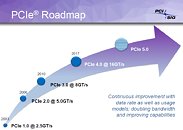- Joined
- Oct 9, 2007
- Messages
- 47,511 (7.48/day)
- Location
- Hyderabad, India
| System Name | RBMK-1000 |
|---|---|
| Processor | AMD Ryzen 7 5700G |
| Motherboard | ASUS ROG Strix B450-E Gaming |
| Cooling | DeepCool Gammax L240 V2 |
| Memory | 2x 8GB G.Skill Sniper X |
| Video Card(s) | Palit GeForce RTX 2080 SUPER GameRock |
| Storage | Western Digital Black NVMe 512GB |
| Display(s) | BenQ 1440p 60 Hz 27-inch |
| Case | Corsair Carbide 100R |
| Audio Device(s) | ASUS SupremeFX S1220A |
| Power Supply | Cooler Master MWE Gold 650W |
| Mouse | ASUS ROG Strix Impact |
| Keyboard | Gamdias Hermes E2 |
| Software | Windows 11 Pro |
The PCI-Express gen 4.0 specification promises to deliver a huge leap in host bus bandwidth and power-delivery for add-on cards. According to its latest draft, the specification prescribes a bandwidth of 16 GT/s per lane, double that of the 8 GT/s of the current PCI-Express gen 3.0 specification. The 16 GT/s per lane bandwidth translates into 1.97 GB/s for x1 devices, 7.87 GB/s for x4, 15.75 GB/s for x8, and 31.5 GB/s for x16 devices.
More importantly, it prescribes a quadrupling of power-delivery from the slot. A PCIe gen 4.0 slot should be able to deliver 300W of power (against 75W from PCIe gen 3.0 slots). This should eventually eliminate the need for additional power connectors on graphics cards with power-draw under 300W, however, the change could be gradual, as graphics card designers could want to retain backwards-compatibility with older PCIe slots, and retain additional power connectors. The PCI-SIG, the special interest group behind PCIe, said that it would finalize the gen 4.0 specification by the end of 2016.

View at TechPowerUp Main Site
More importantly, it prescribes a quadrupling of power-delivery from the slot. A PCIe gen 4.0 slot should be able to deliver 300W of power (against 75W from PCIe gen 3.0 slots). This should eventually eliminate the need for additional power connectors on graphics cards with power-draw under 300W, however, the change could be gradual, as graphics card designers could want to retain backwards-compatibility with older PCIe slots, and retain additional power connectors. The PCI-SIG, the special interest group behind PCIe, said that it would finalize the gen 4.0 specification by the end of 2016.

View at TechPowerUp Main Site








